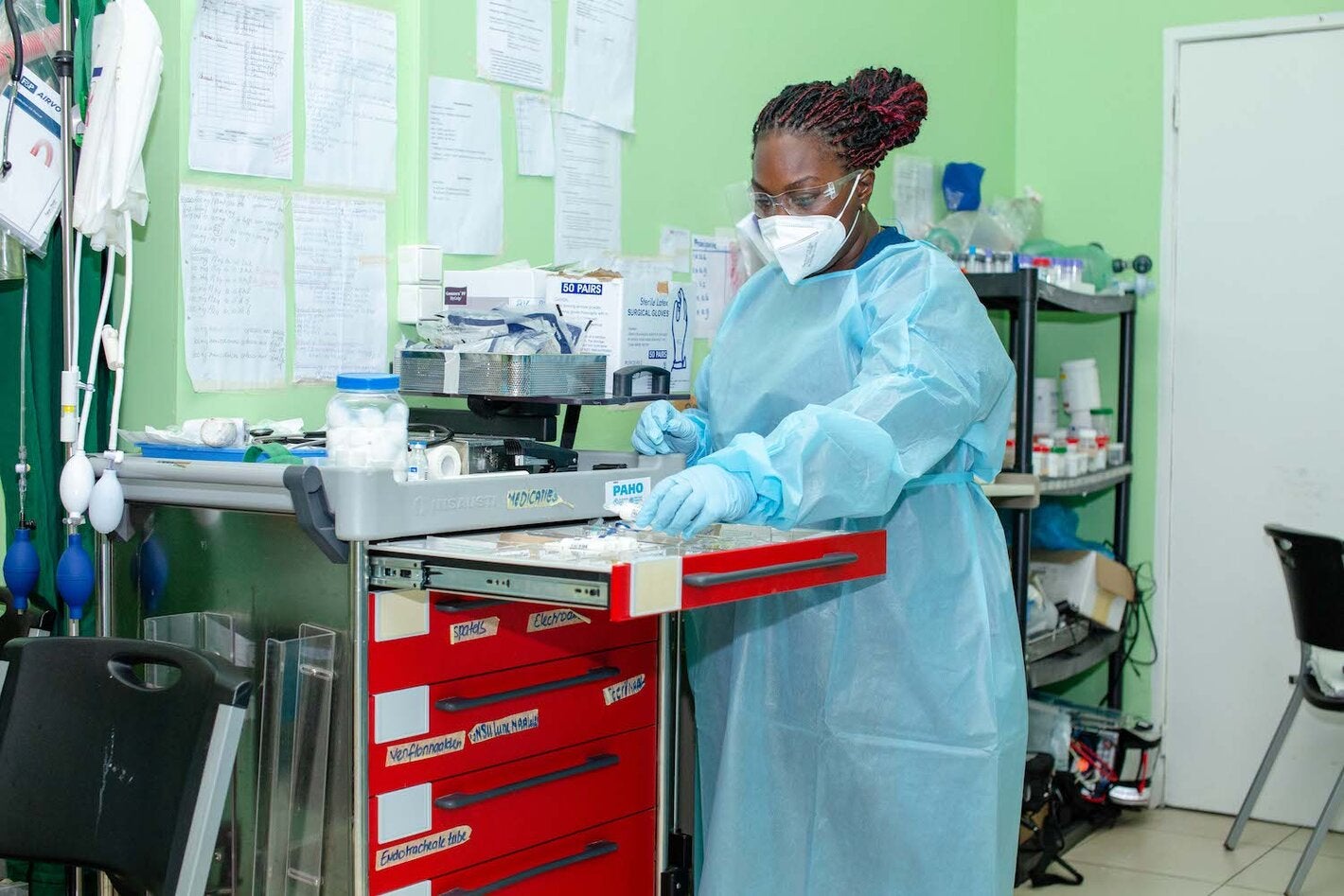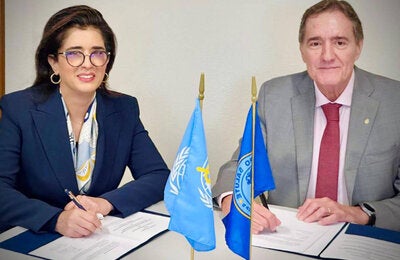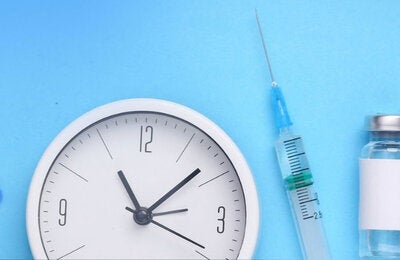
Nurse Samanta Toney working in the COVID-19 Intensive Care Unit in 's Lands Hospital in Suriname.
Suriname, January 18, 2023 (PAHO) – The World Health Organization (WHO) designated the year 2021 as the Year of Health and Care Workers, in appreciation and gratitude for their unwavering dedication in the fight against the COVID-19 pandemic. WHO as well as the Pan American Health Organization (PAHO), acknowledge that human resources for health play a key role in our society's ability to care for the health of its citizens at the global level. In s’Lands Hospital in Suriname, Nurse Samanta Toney, has been leading a group of nurses in the COVID-19 Intensive Care Unit from the arrival of COVID-19 in Suriname in March 2020 until now. She shared information on her experiences in this role, and how PAHO has provided necessary help and tools.
Nurse Toney started her career as a nurse from the age of 17 years, with a dream of one day becoming a Doctor. After working in the Intensive Care Unit at the Academic (AZP) Hospital in her fourth year of her Nursing education, for a year and a half, she was accepted for the Intensive Care Specialization. She finished her training as well as an additional training in supervision and continued working at the ICU while also taking on the role as a supervisor for new nurses in training. After working at the AZP Hospital for 16 years, she assumed a new supervisory role at s’Lands Hospital, where she has been working since August 2015. Currently, Nurse Toney is an Intensive Care Specialized Nurse with a degree in Health Management, Head Nurse of the COVID-19 unit and Coordinator of COVID-19 care at s’Lands Hospital.
The Arrival of COVID-19 in Suriname
When the pandemic reached Suriname in March 2020, the Ministry of Health called upon healthcare workers willing to accompany the Minister to the interior, on an educational mission. Nurse Toney and one other nurse signed up and joined the Minister. While the disease was still relatively unknown at that time, PAHO provided information early on such as: the disease profile, prevention methods, protocols and guidelines for management and infection prevention and control etc., so healthcare workers were as informed as possible and felt more comfortable treating this novel disease.
“Because of the information about COVID-19 that PAHO provided early on, we were able to accompany the Minister of Health to the interior during the first mission after the disease was detected in Suriname”
Not many healthcare workers were willing to work with COVID-19 patients at the time, but Nurse Toney did not shy away from this new challenge and treated the first 10 COVID-19 cases in Suriname after detection. She was part of the first COVID-19 care team that consisted of 8 caretakers at the time. During the second wave, the team grew, as Nurse Toney succeeded in recruiting more nurses to join.
Leading the Team through Personal Loss
At a certain point during the pandemic, when all the ICU beds were occupied, healthcare workers also started getting infected with the virus and the staff shortage, which was already prominent, became worse. Dealing with family members of COVID-19 patients who died remains a difficult task.
“Sometimes not just one patient, but multiple patients from one household died from the disease at the same time, which was terrible to witness and handle. But the biggest impact on the healthcare workers was the loss of their own colleagues, friends and family. We have seen situations where the siblings and parents of nursing colleagues were hospitalized with COVID-19 and losing the fight against the disease. We have had to bury our own staff members, mothers, fathers, sisters, friends and family members because of COVID-19”
Keeping the team motivated at times with such heavy emotional loads is extremely hard, because even taking leave, or a moment to cope was all but impossible. Even Nurse Toney had not been able to take leave yet at the time of the interview, which was already a year and a half after the pandemic hit Suriname.
PAHO’s Support during COVID-19
During the second wave Nurse Toney completed the online course “Introduction to Critical Care Nursing” conducted by PAHO in collaboration with University of West Indies (UWI), which she found incredibly enriching and empowering in her role as COVID-19 caretaker and supervisor.
“There are certain differences in the critical care of COVID-19 patients that were not yet part of standard protocol, and this online course by PAHO, provided us with the tools and knowledge to provide better and safer care for COVID-19 patients”
By the time the third wave hit Suriname, s’Lands Hospital had to open its ICU for COVID-19 patients, and with the support of PAHO among others, we were able to assign a designated ward for ICU COVID-19 patients. During that time, as well as now, Nurse Toney motivated her team and colleagues to complete the COVID-19 Courses on the OpenWHO platform, which were translated in Dutch for Suriname by PAHO. The courses have been an immense support for the team, who is very grateful for PAHO’s support in this regard.
Through donations, PAHO has supported s’Lands Hospital with PPE, oxygen concentrators, patient monitors, and mobile oxygen tanks for the patients.
“I would personally like to thank PAHO for providing donations for COVID-19 patient care. We were able to take care of patients more efficiently and flexibly, helping us to provide better care in COVID-19 ICU thanks to PAHO.”



